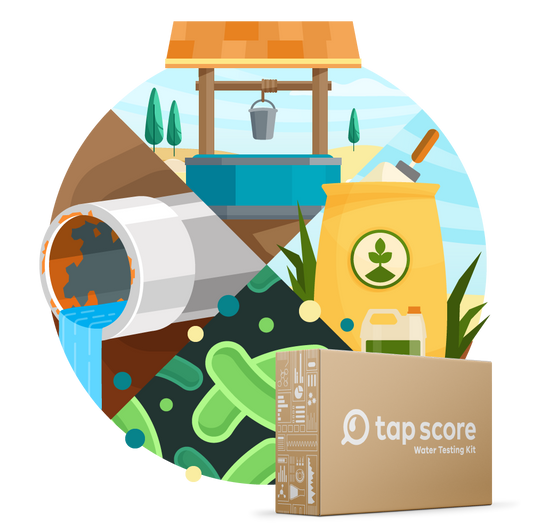
Lithium and Tap Water
Our blog is written by real experts— not AI. Each guide is carefully reviewed and updated based on the latest research. Plus, with no affiliate links, you can count on unbiased insights you can trust.
Small amounts of lithium could have huge impacts–or so some suggest.
Should We All Be Drinking Lithium in Our Water?
The potential benefits of small traces of lithium could be huge, however not that many people are talking about it. While we usually talk about contaminants negatively impacting your health if we find it in drinking water – lithium is a rare example of an element that may actually benefit your health. How is that so?
In this post, we’ll cover what Lithium is, how you might be exposed through drinking water, and what scientists hypothesize the potential benefits could be.
What Is Lithium and How Am I Exposed?
Lithium is a natural metal that appears in rocks, soils, groundwater, surface water and freshwater. Ubiquitous in nature, lithium is commonly found in plants, animals, foods, beverages and drinking water. Most of our exposure to lithium is through our food, but drinking water contributes about one fourth to our exposure to lithium.
There are no major health concerns associated with lithium, and no public health regulations for lithium in drinking water.
How Does Lithium Affect My Health?
Lithium has a long history of proposed medical benefits. Starting back a few thousand of years ago, lithium was discovered in mineral springs and recognized for its healing properties. The most famous being spring was known as the Lithia Springs, thought to have healing powers that attracted big names like Mark Twain and four U.S. presidents including Theodore Roosevelt hoping to reap the benefits.
In the mid-20th century, medical professionals began to experiment with using lithium as medication for mental illnesses including bipolar disorder and depression.[1] It is now a widely used drug with life saving impacts.
Scientists have wondered: Could exposure to low doses of lithium benefit society writ large?
What’s The State of The Research?
A Brief Review of Studies Linking Lithium in Drinking Water and Health Outcomes
A review of the available literature connecting lithium in drinking water and suicide prevention indicates that “higher lithium levels in drinking water may be associated with reduced risk of suicide in the general population”.[2]
The “may” is operative here – research isn’t completely clear yet on the impacts of being exposed to lithium, though the shared hypothesis of many studies is that it is a positive benefit.
Texas Study
The positive correlation between small amounts of lithium and improved mental cognition was proposed in a 2013 study in Texas which found that “lithium levels in the public water supply were negatively associated with suicide rates in most statistical analyses”.[3] The study, however, was criticized for lack of statistical analysis. Researchers largely left the topic alone until recently.
Denmark Study
A nationwide study in Denmark involving 73,731 patients with dementia and 733,653 control individuals concluded that “long-term increased lithium exposure in drinking water may be associated with a lower incidence of dementia”.[4] However, while the study found that the population receiving over 10 micrograms of lithium in drinking water had a 17% decrease in dementia, the population receiving between 5.1 - 10 micrograms of lithium in actually increased in likelihood of incidences of dementia by 22%. This suggests that there is some ambivalence over the impact of lithium exposure depending on the amount people are exposed to.
Lithuania Study
A study examining “the relationship between lithium levels in drinking water and suicide rates in Lithuania”, found that between the years 2009-2013 there was a statistically significant correlation between higher levels of lithium in drinking water and lower suicide rates – but only in men only.[5]
Japan Study
Another study in Japan indicated “that natural levels of lithium in drinking water might have a protective effect on the risk of suicide among females”.[6]
Proposed Medical Benefits of Lithium
Lithium is prescribed as a medication for mental illnesses such as: bipolar disorder, depression, and schizophrenia. Prescription doses are at levels which are 50-600 times more than the average daily intake from food and far more than then the normal exposure of lithium through drinking water.[7] Very small levels over long periods of time are hypothesized to potentially promote brain health, which could decrease the rate of mental illnesses and suicides–which is the 10th leading cause of death in the United States.[8]
How Might Lithium Improve Cognition?
The mechanism by which lithium affects your brain is unknown. Some suggest that lithium increases the activity of chemical messengers in the brain. Another possibility is that “lithium exposure, even in these tiny amounts, might actually be neuroprotective or even enhance the growth of neurons”.[9]
Don’t Put Lithium In Drinking Water Just Yet
While studies are finding that trace amounts of lithium in drinking water might benefit our mental health, all studies indicate the need for further research and the potential for other factors impacting the results.
We also receive on average more lithium from our food than from our drinking water, but diet is hard to measure in large studies, therefore it is difficult to understand its impact.
Lithium can also be lethal at high and even potentially lethal at low doses.
While research is promising, the actual mechanisms behind lithium's impact on the brain are still debated – so it's best not to jump to any conclusions and alter our water supply with added lithium!
Questions?
Send any concerns or inquiries to Tap Score and you’ll be connected to a water quality expert in no time – support@mytapscore.com.
Sources and References
▾- The history of lithium therapy - PMC
- Lithium in the public water supply and suicide mortality in Texas
- Association of Lithium in Drinking Water With the Incidence of Dementia
- Lithium levels in the public drinking water supply and risk of suicide: A pilot study - ScienceDirect
- Lithium in Tap Water and Suicide Mortality in Japan - PMC
- Lithium in Drinking Water and Incidence of Suicide: A Nationwide Individual-Level Cohort Study with 22 Years of Follow-Up - PMC
- Suicide is a Leading Cause of Death in the United States | NIMH
- Should We All Take a Bit of Lithium? - The New York Times










